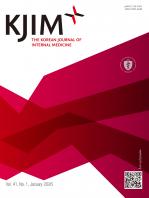|
Nephrology / Original Article
Alleviation of renal ischemia/reperfusion injury by exosomes from induced pluripotent stem cell-derived mesenchymal stem cells
Sun Woo Lim, Kyung Woon Kim, Bo Mi Kim, Yoo Jin Shin, Kang Luo, Yi Quan, Sheng Cui, Eun Jeong Ko, Byung Ha Chung, Chul Woo Yang
Korean J Intern Med. 2022;37(2):411-424. Published online September 16, 2021
Background/Aims: Renal ischemia followed by reperfusion (I/R) is a leading cause of acute kidney injury (AKI), which is closely associated with high morbidity and mortality. Studies have shown that induced pluripotent stem cell (iPSC)-derived mesenchymal stem cells (iMSCs) exert powerful therapeutic..
|
|
|
Nephrology / Original Article
Water-soluble coenzyme Q10 provides better protection than lipid-soluble coenzyme Q10 in a rat model of chronic tacrolimus nephropathy
Sheng Cui, Kang Luo, Yi Quan, Sun Woo Lim, Yoo Jin Shin, Kyung Eun Lee, Hong Lim Kim, Eun Jeong Ko, Ju Hwan Kim, Sang J. Chung, Soo Kyung Bae, Byung Ha Chung, Chul Woo Yang
Korean J Intern Med. 2021;36(4):949-961. Published online January 12, 2021
Background/Aims: Coenzyme Q10 (CoQ10), is a promising antioxidant; however, low bioavailability owing to lipid-solubility is a limiting factor. We developed water-soluble CoQ10 (CoQ10-W) and compared its effects with conventional lipid-soluble CoQ10
|
|
|
Nephrology / Original Article
The therapeutic efficacy of water-soluble coenzyme Q10 in an experimental model of tacrolimus-induced diabetes mellitus
Yi Quan, Kang Luo, Sheng Cui, Sun Woo Lim, Yoo Jin Shin, Eun Jeong Ko, Ju Hwan Kim, Sang J. Chung, Soo Kyung Bae, Byung Ha Chung, Chul Woo Yang
Korean J Intern Med. 2020;35(6):1443-1456. Published online April 14, 2020
Background/Aims: Coenzyme Q10 (CoQ10) has antioxidant effects and is commercially available and marketed extensively. However, due to its low bioavailability, its effects are still controversial. We developed a water-soluble CoQ10-based micelle formulation (CoQ10-W) ..
|
|
|
Nephrology / Original Article
Assessment of nephrotoxicity of herbal medicine containing aristolochic acid in mice
Yi Quan, Long Jin, Kang Luo, Jian Jin, Sun Woo Lim, Yoo Jin Shin, Eun Jeong Ko, Byung Ha Chung, Chul Woo Yang
Korean J Intern Med. 2020;35(2):400-407. Published online November 21, 2019
Background/Aims: It is undetermined if herbal medicines (HM) containing aristolochic acid (AA)-containing have similar nephrotoxicity to AA itself.
Methods: We administered HM containing a high concentration of AA for 5 days (short-term study) or a low concentration of AA for 30 days (long-term stu..
|
|
|
















